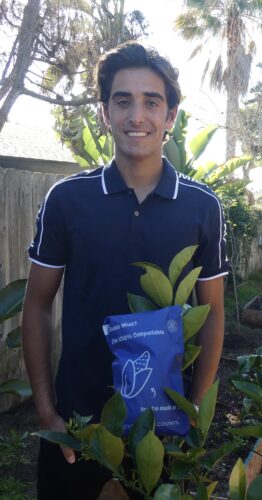Shervin Dehmoubed––sophomore at Yale and stellar tennis player––is also a CEO, having started his entrepreneurial journey when he was just fifteen. He launched a children’s toy company specializing in products for kids diagnosed with ADHD/ADD, making a six-figure revenue within the first three years. This success fueled his following projects, Pik ‘le’ Ball, a pickleball accessory and clothing line, and a software company that built iOS apps for health and fitness. These experiences gave him the unique perspective and required expertise to launch his latest and most successful company, EcoPackables.
Dehmoubed was shocked to discover how much plastic waste even a small brand could produce when working on Pik ‘le’ Ball. Thus, he launched a sustainable packaging company that sells packaging films made from recycled or compostable materials, aiming to find solutions to promote sustainability within the private sector. “This was during Covid, and e-commerce was booming, so I decided I wanted to do something about this,” Dehmoubed said.
The key technology is a compostable film made from a blend of polylactic acid (PLA) and a bio-based polymer (PBAT). These films could eliminate “greenwashing” when an organization spends more time and money marketing itself as environmentally friendly than minimizing its environmental impact. PLA and PBAT are already used in biodegradable plastics such as waste bags. However, to make the films more suitable for packaging, Dehmoubed made them thicker and added certain proportions of different renewable elements to make them more sustainable. Now, their compostable film, called D42, is certified to degrade in home compost environments within 180 days and industrial compost environments within 90 days. Dehmoubed claims that EcoPackables is the most sustainable packaging company because they have the highest proportion of renewable resources (organic materials) to PBAT while still breaking down into organic biomass, water, and CO2, leaving behind zero plastic waste. “I’ve been very passionate about reducing plastic waste and stopping climate change. Specifically, how you can reduce your carbon footprints based on how you produce packaging material and handle proper end-of-life disposal,” Dehmoubed said.
Historically, the packaging industry has been one of the most commoditized––no company owns more than five percent of the market share. For a younger entrepreneur like Dehmoubed, building a brand in such an environment was challenging. Thus, he built a brand focused on sustainability instead of being a direct competitor of packaging companies. He was not interested in cutting costs or taking shortcuts to increase the bottom line, or the company’s net profit, but rather wanted to hit the triple bottom line: good for the customer, good for the planet, and good for the company. His biggest challenge was selling his vision to traditionally archaic buyers hyper-focused on net profits. However, by convincing companies to look towards the younger generations for future sustainable operations, Ecopackables is being used by brands such as Ivory Ella, Beats, and Bud Light.
Dehmoubed envisions that EcoPackables will become a globally recognized brand for its sustainable practices. He hopes to become a one-stop shop for brand-oriented companies looking to clean up their operations. Currently, they have two more products in the works: food-safe packaging developed using post-consumer recycled content and curbside recyclable Ocea™ brand polythene bags. The thin Ocea™ plastic bags are made from Forest Stewardship Council certified mixed paper, ensuring that products come from responsibly managed forests that provide environmental, social, and economic benefits. Ocea launched their product earlier this year to eliminate plastic from accumulating in our oceans. “Packaging is extremely important because it’s the first part of your product the customer interacts with. And we know how important first impressions are,” Dehmoubed said.

